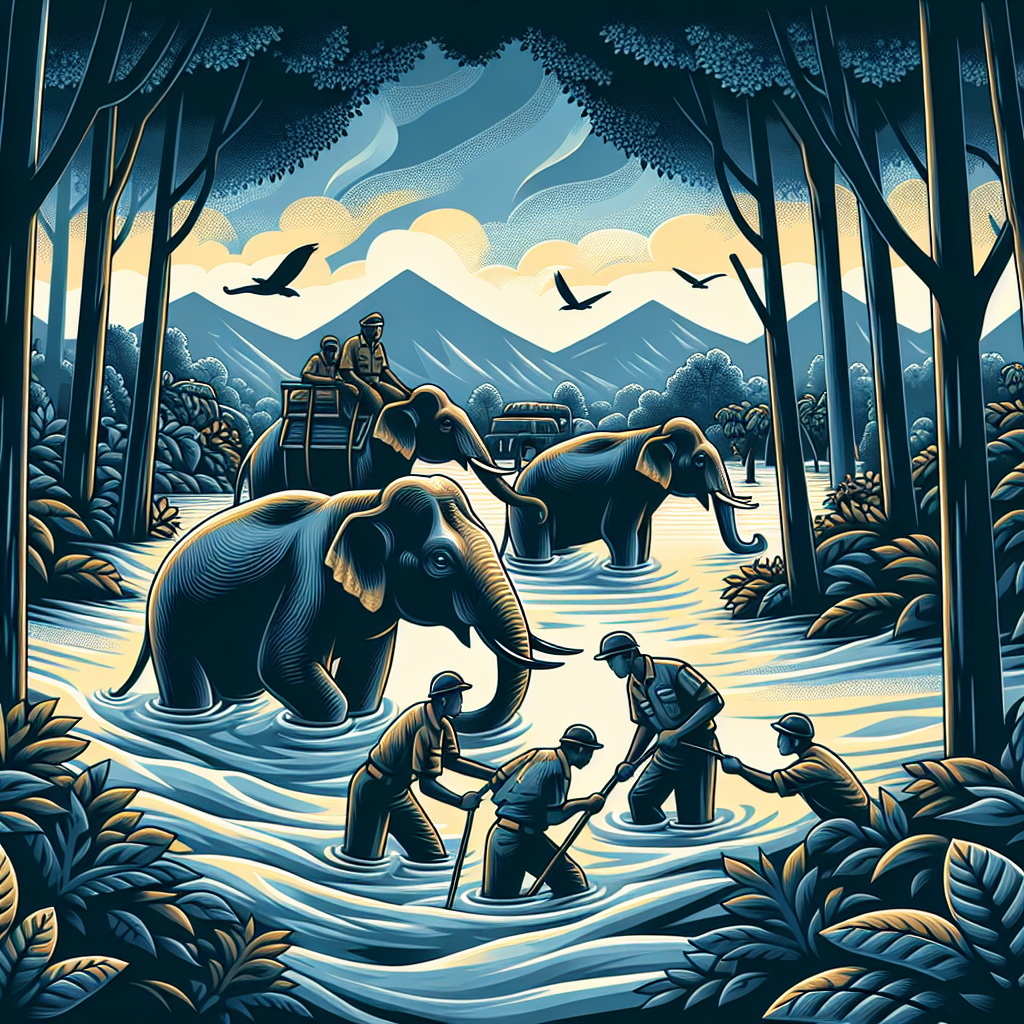A lady named Sarah used to think that the Earth getting warmer was not true. She heard this from friends and a man on the radio. But then she heard different stories from another place that talks on the radio. Sarah learned she was wrong and started to learn more. Now she helps other people learn about the Earth getting warmer and teaches kids too.
Sarah had a hard time when she changed her mind because she felt alone and very sad. But she knew it was important to know the truth and to do something about it. She says we should be nice to people who don’t think the Earth is getting warmer and find things we all care about. Sarah changed a lot and knows we can all learn new things. She wants everyone to think about what they believe and help our planet.
Original news source: I thought climate change was a hoax. Now I’ve changed my mind’ (BBC)
Listen
Slow
Normal
Fast
Group or Classroom Activities
Warm-up Activities:
– Charades
Instructions: Divide the class into two teams. Give each team a set of vocabulary words related to the article (e.g. Earth, warmer, radio, learn, teach). One person from each team will act out the word without speaking, while their team members guess what word it is. The team with the most correct guesses wins.
– News Summary
Instructions: Ask the students to work in pairs or small groups. Give each group a copy of the article and ask them to read it together. Then, have them summarize the main points of the article in their own words. Afterward, have a class discussion to compare their summaries and discuss any differences.
– Opinion Poll
Instructions: Write the statement “I believe that the Earth is getting warmer” on the board. Ask the students to stand up and move to one side of the classroom if they agree with the statement, and to the other side if they disagree. Give them a few minutes to discuss their reasons with the people on their side. Then, ask a few students from each side to share their opinions with the class.
– Vocabulary Pictionary
Instructions: Write a list of vocabulary words from the article on the board (e.g. Earth, warmer, radio, learn, teach). Divide the class into pairs or small groups. One person from each group will choose a word from the list and draw a picture to represent it, while their partner(s) try to guess the word. The first group to correctly guess the word wins a point. Repeat until all the words have been used.
– Pros and Cons
Instructions: Divide the class into pairs or small groups. Give each group a piece of paper and ask them to draw a line down the middle. On one side, they should list the pros (advantages) of believing that the Earth is getting warmer, and on the other side, they should list the cons (disadvantages). Afterward, have a class discussion to share their ideas and discuss the different perspectives.
Comprehension Questions:
1. Who used to think that the Earth getting warmer was not true?
2. Where did Sarah hear different stories about the Earth getting warmer?
3. How did Sarah feel when she changed her mind?
4. Why did Sarah think it was important to know the truth?
5. What does Sarah say we should do to people who don’t think the Earth is getting warmer?
6. What does Sarah want everyone to think about?
7. What does Sarah want to do to help our planet?
Go to answers ⇩
Listen and Fill in the Gaps:
A lady named Sarah used to think that the Earth (1)______ warmer was not true. She heard this from friends and a man on the radio. But then she heard different (2)______ from another place that talks on the radio. Sarah learned she was wrong and started to learn more. Now she helps (3)______ people learn about the Earth getting warmer and (4)______ kids too.
Sarah had a hard time when she changed her mind because she (5)______ alone and very sad. But she knew it was important to know the (6)______ and to do something about it. She says we should be nice to people who don’t think the Earth is getting warmer and (7)______ (8)______ we all care about. Sarah changed a lot and knows we can all learn new things. She wants everyone to think about what they believe and help our planet.
Go to answers ⇩
Discussion Questions:
Students can ask a partner these questions, or discuss them as a group.
1. What is the Earth getting warmer?
2. How would you feel if you found out something you believed was not true?
3. Do you think it is important to know the truth? Why or why not?
4. What do you think Sarah means when she says we should be nice to people who don’t think the Earth is getting warmer?
5. Do you think it is important to help our planet? Why or why not?
6. How do you think Sarah felt when she changed her mind?
7. What do you think Sarah means when she says we can all learn new things?
8. Do you like learning new things? Why or why not?
9. What do you believe about the Earth getting warmer?
10. Why do you think Sarah wants everyone to think about what they believe?
11. Have you ever changed your mind about something? How did you feel?
12. What do you think we can do to help our planet?
Individual Activities
Vocabulary Meanings:
Match each word to its meaning.
Words:
1. Sarah
2. Earth
3. warmer
4. true
5. alone
6. sad
7. believe
8. planet
Meanings:
(a) Something that is real
(b) To think something is true
(c) When it gets hotter
(d) When you are by yourself
(e) The place where we live
(f) Our home in space
(g) Feeling unhappy
(h) A lady’s name
Go to answers ⇩
Multiple Choice Questions:
1. What did Sarah used to think about the Earth getting warmer?
(a) It was true
(b) It was not true
(c) She didn’t know
(d) It was cold
2. Where did Sarah hear different stories about the Earth getting warmer?
(a) Her friends
(b) Her school
(c) Her parents
(d) Another place that talks on the radio
3. How did Sarah feel when she changed her mind?
(a) Alone and very sad
(b) Happy and excited
(c) Angry and frustrated
(d) Confused and scared
4. Why did Sarah think it was important to know the truth about the Earth getting warmer?
(a) So we can do something about it
(b) So we can ignore it
(c) So we can forget about it
(d) So we can be sad
5. What does Sarah think we should do to people who don’t think the Earth is getting warmer?
(a) Ignore them
(b) Be mean to them
(c) Be nice to them
(d) Forget about them
6. What does Sarah want everyone to do?
(a) Ignore what they believe and help our planet
(b) Forget about what they believe and help our planet
(c) Be sad about what they believe and help our planet
(d) Think about what they believe and help our planet
7. What did Sarah do when she realized she was wrong about the Earth getting warmer?
(a) She ignored it and moved on
(b) She learned more and helps other people learn
(c) She forgot about it and moved on
(d) She got angry and gave up
8. What does Sarah teach kids about?
(a) The Earth getting colder
(b) The Earth staying the same
(c) The Earth getting warmer
(d) The Earth disappearing
Go to answers ⇩
True or False Questions:
1. She wants no one to think about what they believe and harm our planet.
2. Sarah felt happy and surrounded when she changed her mind.
3. She believes it is unimportant to know the truth and take action.
4. Sarah thinks we should be nice to people who don’t believe in global warming.
5. She heard different stories on the radio that made her change her mind.
6. Sarah used to believe that the Earth was not getting warmer.
7. She also teaches kids about this important topic.
8. Sarah now hinders other people from learning about the Earth getting warmer.
Go to answers ⇩
Write a Summary:
Write a summary of this news article in two sentences.
Check your writing now with the best free AI for English writing!
Writing Questions:
Answer the following questions. Write as much as you can for each answer.
Check your answers with our free English writing assistant!
1. Who used to think that the Earth getting warmer was not true?
2. Where did Sarah hear different stories about the Earth getting warmer?
3. How did Sarah feel when she changed her mind?
4. What does Sarah think we should do to people who don’t think the Earth is getting warmer?
5. What does Sarah want everyone to think about?
Answers
Comprehension Question Answers:
1. Who used to think that the Earth getting warmer was not true?
Sarah used to think that the Earth getting warmer was not true.
2. Where did Sarah hear different stories about the Earth getting warmer?
Sarah heard different stories about the Earth getting warmer from another place that talks on the radio.
3. How did Sarah feel when she changed her mind?
Sarah felt alone and very sad when she changed her mind.
4. Why did Sarah think it was important to know the truth?
Sarah thought it was important to know the truth because it helps us understand what is happening to our planet.
5. What does Sarah say we should do to people who don’t think the Earth is getting warmer?
Sarah says we should be nice to people who don’t think the Earth is getting warmer and find things we all care about.
6. What does Sarah want everyone to think about?
Sarah wants everyone to think about what they believe and how it can help our planet.
7. What does Sarah want to do to help our planet?
Sarah wants to teach people about the Earth getting warmer and help them learn how to take care of our planet.
Go back to questions ⇧
Listen and Fill in the Gaps Answers:
(1) getting
(2) stories
(3) other
(4) teaches
(5) felt
(6) truth
(7) find
(8) things
Go back to questions ⇧
Vocabulary Meanings Answers:
1. Sarah
Answer: (h) A lady’s name
2. Earth
Answer: (e) The place where we live
3. warmer
Answer: (c) When it gets hotter
4. true
Answer: (a) Something that is real
5. alone
Answer: (d) When you are by yourself
6. sad
Answer: (g) Feeling unhappy
7. believe
Answer: (b) To think something is true
8. planet
Answer: (f) Our home in space
Go back to questions ⇧
Multiple Choice Answers:
1. What did Sarah used to think about the Earth getting warmer?
Answer: (b) It was not true
2. Where did Sarah hear different stories about the Earth getting warmer?
Answer: (d) Another place that talks on the radio
3. How did Sarah feel when she changed her mind?
Answer: (a) Alone and very sad
4. Why did Sarah think it was important to know the truth about the Earth getting warmer?
Answer: (a) So we can do something about it
5. What does Sarah think we should do to people who don’t think the Earth is getting warmer?
Answer: (c) Be nice to them
6. What does Sarah want everyone to do?
Answer: (d) Think about what they believe and help our planet
7. What did Sarah do when she realized she was wrong about the Earth getting warmer?
Answer: (b) She learned more and helps other people learn
8. What does Sarah teach kids about?
Answer: (c) The Earth getting warmer
Go back to questions ⇧
True or False Answers:
1. She wants no one to think about what they believe and harm our planet. (Answer: False)
2. Sarah felt happy and surrounded when she changed her mind. (Answer: False)
3. She believes it is unimportant to know the truth and take action. (Answer: False)
4. Sarah thinks we should be nice to people who don’t believe in global warming. (Answer: True)
5. She heard different stories on the radio that made her change her mind. (Answer: True)
6. Sarah used to believe that the Earth was not getting warmer. (Answer: True)
7. She also teaches kids about this important topic. (Answer: True)
8. Sarah now hinders other people from learning about the Earth getting warmer. (Answer: False)
Go back to questions ⇧















